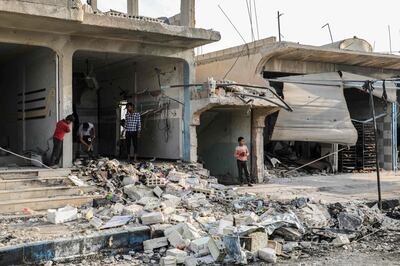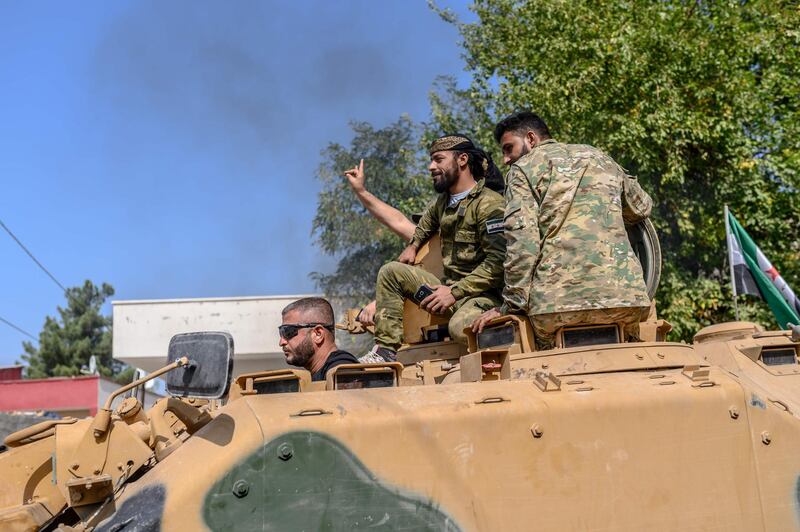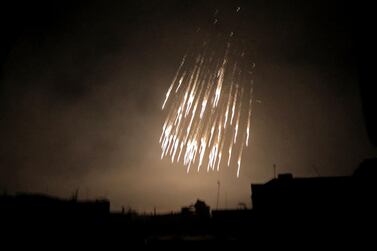Turkey’s most recent operation in Syria involved Nato’s second-largest military again joining forces with local militias that have been widely accused of human rights abuses and war crimes.
When Ankara sent its troops across the border to tackle the Kurdish-led Syrian Democratic Forces on October 9, they were accompanied by different fighters operating under the banner of the Syrian National Army.
Formerly known as the Free Syrian Army, the SNA forces consisted of about 14,000 fighters from groups such as Ahrar Al Sharqiya, the Sultan Murad Division and the Hamza Division.
These groups, largely comprised of militants from north and east Syria, have provided the spearhead in Turkey’s three operations against the SDF and ISIS.
Such groups include extremists that are staunchly opposed to the secular ideology of the Syrian Democratic Council, the SDF’s political wing.
“Ahrar Al Sharqiya appears to be driven both by political animus against the SDC’s ideology and policies as well as religious antagonism against secular Kurds in Syria and beyond,” said Aykan Erdemir, a senior fellow at the Foundation for Defence of Democracies and a former Turkish MP.
Days after the start of Operation Peace Spring, fighters from Ahrar Al Sharqiya set up a checkpoint on the M4 road south of the border town of Tel Abyad. From here, videos emerged on the group’s social media channels showing the execution of at least one prisoner.

They were also accused of killing Hevrin Khalaf, secretary general of the Future Syria Party, on the same stretch of motorway after her car was riddled with bullets. The SNA denied responsibility but said it was investigating this and other “breaches”.
The British-based Syrian Observatory for Human Rights said at least six civilians were killed on the road during the early days of Turkey's operation.
Ahrar Al Sharqiya, which means Free Men of the East, largely draws its fighters from the Arab tribes of Deir Ezzor province. It was formed from Ahrar Al Sham, a Salafist group also tied to Turkey, whose members have also been accused of having links to Al Qaeda’s Syrian affiliate, Jabhat Al Nusra.
Since it was founded in 2016, Ahrar Al Sharqiya has been involved in threatening US troops and attempts to enforce strict dress codes for women. It has also been accused of a list of crimes including murder, looting and kidnapping.
Its fighters have sometimes posted videos of summary executions and the desecration of bodies, including beheadings.
On Wednesday, unverified footage emerged of militants from Al Majd Corps, another Turkey-allied group, trampling on the corpse of a female Kurdish fighter, with one fighter laughing and referring to her as a “whore” and a “pig”.
The latest video came as James Jeffrey, the US special envoy to Syria, told Congress that American forces saw evidence of war crimes during the Turkish operation.
Turkish officials have denied that war crimes were committed.
The claims have led to fears of sectarian bloodshed between Turkey’s proxies, who are mainly Arab or Turkmen, and the Kurdish population of north-east Syria.
In the aftermath of Turkey’s 2018 incursion into Afrin, a Kurdish-majority district of north-west Syria, SNA groups faced accusations of abuses.
As with this month’s attack on the Kurdish-controlled region of north-east Syria, Turkey was targeting the People’s Protection Units (YPG), the backbone of the SDF that Turkey considers to be a terrorist group because of its ties to Kurdish militants who have waged an on-off battle against Ankara since 1984.
In a report detailing abuses committed by all sides in the conflict, the UN commission on Syria said “arbitrary arrests, detention and pillaging became pervasive” in Afrin following the operation.
The report also documented kidnappings for ransom and “credible allegations of torture and ill-treatment, often targeting individuals of Kurdish origin” by armed groups.
It added: “The commission finds there are reasonable grounds to believe that armed group members in Afrin committed the war crimes of hostage-taking, cruel treatment, torture and pillage.”
In interviews with Amnesty International, locals said militants from Ahrar Al Sharqiya and Sultan Murad were responsible for serious human rights breaches.
Amnesty’s Middle East research director, Lynn Maalouf, said Turkey had responsibility for maintaining law and order. “It cannot evade responsibility by using Syrian armed groups to carry out its dirty work,” she said.
The Observatory said it had recorded “hundreds of cases” of forced displacement by Turkish-backed groups in Afrin aimed at changing the enclave into a Sunni Arab-dominated region – a claim repeated by critics of the north-eastern operation, which has displaced nearly 180,000 civilians.
Mr Erdemir said Turkey’s attempts to prevent war crimes were bound to fail “given the radical worldview and unruly nature of these proxy forces”.
“In the near future, militant groups such as Ahrar Al Sharqiya, which have a long history of resorting to violence among themselves to settle scores, will also pose a significant security threat to Turkey, and particularly to secular individuals and ethnic and religious minorities in Turkey,” he said.







